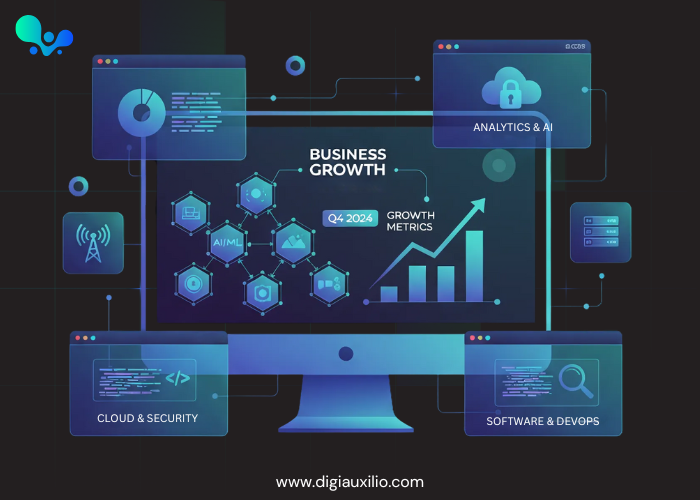Technology is becoming the driving force behind business growth, rather than an auxiliary function. For all businesses, from startups to global enterprises, innovative technology has proved innovative technology has proved critical to efficiency, access to new markets, and enhanced customer experience.
Whether it’s the artificial intelligence being integrated into business processes, the cloud computing infrastructure that is being adopted, or the various e-commerce solutions available, poorly invested options do little to transform a business. For a business to thrive, innovative technology must be directed to the business goals.
1. Artificial Intelligence (AI) and Machine Learning
Artificial intelligence happens to be one of the most transformative technologies driving business today. It reviews massive data sets to spot patterns that assist firms make better decisions, automate work processes, and improve personalization for customers.
How businesses use AI:
- Chatbots and virtual assistants for customer support
- Predictive analytics to forecast demand and trends
- Fraud detection and cybersecurity alerts
- Personalized product recommendations in e-commerce
Machine Learning (ML) enables businesses to continually refine processes and create intelligent systems that learn and adapt over time.
2. Cloud Computing Platforms
The cloud is what modern business runs on. Companies do not depend on physical servers anymore. They use cloud platforms such as AWS, Microsoft Azure, and Google Cloud to store their data, run applications, and scale with ease.
Benefits of cloud computing:
- Cost savings with pay-as-you-go models
- Scalability for growing workloads
- Remote access for distributed teams
- Enhanced data security and backup
For startups and enterprises alike, cloud platforms provide the flexibility needed to innovate quickly and expand globally.
3. E-Commerce Platforms
One of the most significant commercial revolutions is e-commerce. Integrated solutions from Shopify, Magento, WooCommerce, and BigCommerce simplify and automate online store setup, administration, and payment processing, including inventory control.
Why they matter:
- 24/7 global reach for businesses
- Secure and flexible payment options
- Personalized shopping experiences
- Built-in marketing tools like SEO and email campaigns
For retailers and brands, e-commerce platforms are essential to stay competitive and meet growing customer demands.
4. Mobile App Development Frameworks
Mobile use is rising thus businesses take up mobile-first plans. React Native, Flutter, and Swift are frameworks that help make strong apps run on many devices.
Business impact:
- Improved customer engagement through mobile apps
- Enhanced brand loyalty with personalized features
- On-the-go services for industries like food delivery, transport, and retail
- Push notifications for direct marketing and updates
Mobile apps have become a vital platform for customer interaction and revenue generation.
5. Data Analytics and Business Intelligence (BI) Tools
For businesses, data has become the “new oil” and tools like Tableau, Power BI, and Google Analytics allow organizations to analyze data and automate decision making processes which are critical for business growth.
How businesses use BI tools:
- Tracking KPIs and performance metrics
- Understanding customer behavior
- Identifying new market opportunities
- Streamlining operations through insights
By turning raw data into actionable strategies, businesses gain a competitive edge in their industries.
6. Internet of Things (IoT)
IoT physically links various devices- sensors, automobiles, and apparatus among other things to the web. This enables real-time observation as well as improved choices that can be made based on more information.
Applications in business:
- Smart logistics and fleet management
- Automated inventory systems
- Predictive maintenance for machinery
- Smart homes and wearable technology for consumers
IoT platforms help businesses cut costs, improve efficiency, and create new revenue streams.
7. Digital Marketing Platforms
No business growth strategy is complete without digital marketing. Company can now reach their intended target market and keep a tab on how well they perform using Google Ads, Facebook Business Suite, LinkedIn Ads, and HubSpot.
Advantages:
- Cost-effective customer acquisition
- Precise targeting with AI-driven algorithms
- Multi-channel marketing (search, social, email, display)
- Real-time analytics for better ROI
Digital marketing platforms have become indispensable for building brand awareness and driving conversions.
8. Collaboration and Productivity Platforms
Interaction is a part of hybrid work, and Slack, Microsoft Teams, Trello, and Asana are assisting in ensuring a smooth workflow.
Business benefits:
- Enhanced communication across teams
- Real-time file sharing and collaboration
- Task management and progress tracking
- Integration with other business tools
These platforms ensure that remote and hybrid teams remain productive and aligned.
9. Blockchain Technology
Most people think about cryptocurrencies when they hear blockchain. Right now it is being used in supply chain management.
Business use cases:
- Transparent supply chains for logistics
- Secure peer-to-peer payments
- Smart contracts that reduce legal overheads
- Anti-counterfeiting in industries like luxury goods and pharmaceuticals
By providing transparency and security, blockchain adds trust to digital ecosystems.
10. Customer Relationship Management (CRM) Platforms
Customer relationship management platforms such as Salesforce, HubSpot, and Zoho CRM are used to oversee customer dealings and enhance the sales process.
Key advantages:
- Centralized customer data
- Automated sales and follow-up processes
- Improved lead tracking and nurturing
- Stronger customer relationships
CRMs are vital for businesses that want to scale their sales and enhance customer loyalty.
Conclusion
The swift development of business technology creates new tools that enable businesses to improve customer service, operational efficiency, and expand into new industries. Cloud computing, mobile, and artificial intelligence are some of the emerging technologies that provide firms with long-term growth.
For company that wish to remain relevant, putting money into these systems is not a choice anymore—it’s the door to enduring prosperity.


